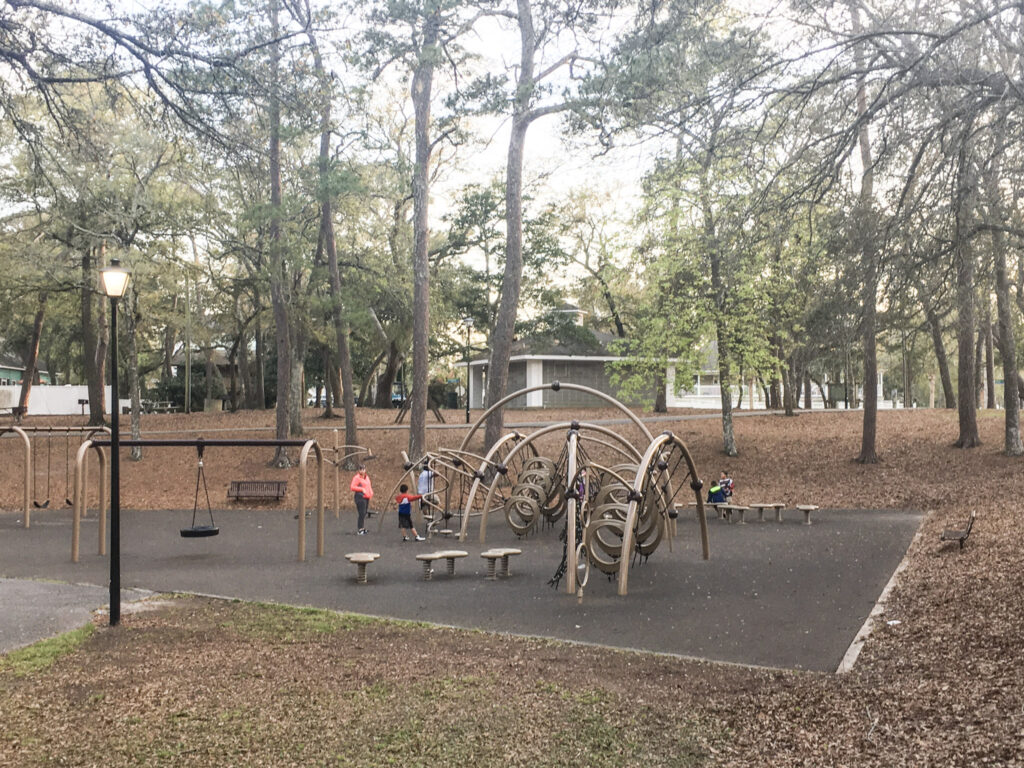
A couple of children spent their Saturday playing at McLean Park. They are making sure to adhere to the social distancing guidelines and limiting their groups to under three.
By Ruben Lowman and Andrea Maestre
The coronavirus pandemic crisis currently enveloping the globe has overwhelmed hospital systems and funeral homes, locked down major cities and entire countries all over the world and brought the global economy to a standstill.
This is an unprecedented situation that is unfolding rapidly, collectively, and in real time. The North Myrtle Beach Times has spoken with many residents and asked them to share their experiences during the coronavirus. One thing that is clear is that people from all segments of society have been significantly affected by this, many seeing their lives permanently altered in the space of a few days or weeks. From hotel employees to restaurant workers, account executives to healthcare professionals, they are all uncertain about what the future holds for them, both personally and professionally. The Times will be reporting on their stories for as long as the ongoing crisis continues to threaten the health and safety of members of the community.
The recently passed city ordinance outlawing the short-term rental of all buildings until at least the beginning of May, coupled with the governor’s closure of all non-essential businesses over the next couple of weeks, has effectively shut down the tourism industry completely in this area. As so many rely on hospitality for their income, a lot of people all along the Grand Strand are hurting right now.
Individuals with children, like the single mother of two, Daris Lopez, 37, are finding it increasingly difficult to make ends meet. Before coronavirus, the North Myrtle Beach resident worked full-time at a large resort in the area. “I used to work two shifts, in the morning and in the afternoon, as a housekeeper,” she said.
Until just a few weeks ago her stable life was unexpectedly upended. She was fired, along with all her co-workers within the cleaning and maintenance departments, immediately losing all of her income. She was laid off until further notice, with no reassurance her position would be there in the future. As she recounted to The Times, “The cleaning and maintenance departments use to have around 150 employees, and we were all fired. The owners told us, ‘We are closing.’”
She brought her children to the park last weekend so they could get some fresh air and escape the isolation and anxiety they have been feeling since schools were closed. “They have been attending virtual classes. I finally decided to take them out today because I saw one of my sons so sad and bored inside the house and I felt really bad for him,” she said.
When asked how she was staying up-to-date on the latest developments of the crisis, she responded, “I usually watch the news on TV but they are always announcing that this situation is not going to get better anytime soon, so I don’t like to watch the news anymore because I feel more panic about it.”
In order to ensure she can still pay her bills, Ms. Lopez is being extremely frugal at the moment, saying she is “saving all the money I can, so I spend just $10 or $15 every time I need to get groceries. My two kids and I have been eating rice and beans every day.”
Toilet paper has become a sort of barometer for this crisis, to people of all cultures, as stores across the world have mostly been out of stock since the spread of coronavirus escalated last month. As a result, Ms. Lopez has learned that the best time to go shopping for essentials is very early in the morning, when the supply has just been re-stocked and yet to be depleted. She also stated that because she worked as a housekeeper she was already prepared with a multitude of cleaning supplies. She has been washing her hands “three or four times per hour, and putting sanitizer on my hands every time I can.”
Like us all, she will simply be following the social distancing and hygiene guidelines set out by the government for the next several weeks and months, until there is more certainty about where and when she will be working next.
For anyone looking for help in this uncertain time, there are many resources you can access. There are charities who are giving money, food and other essential items to those in need, and several programs within the government have either been established or beefed up in response to the spread of COVID-19.
The $2 trillion stimulus package that was signed into law this week by President Trump provides some vital relief to the individuals who are hurting the most right now. It includes payments made directly to most Americans, in the form of $1,200 checks, which will either be deposited into their bank accounts or sent to their mailing address on file with the Social Security Administration, over the next month. There is also a significant expansion to unemployment insurance and additional emergency funds provided to those who are jobless, along with hundreds of billions to be used for loans to small businesses.
 North Myrtle Beach Times Serving our Community and the Grand Strand for over 50 years
North Myrtle Beach Times Serving our Community and the Grand Strand for over 50 years

